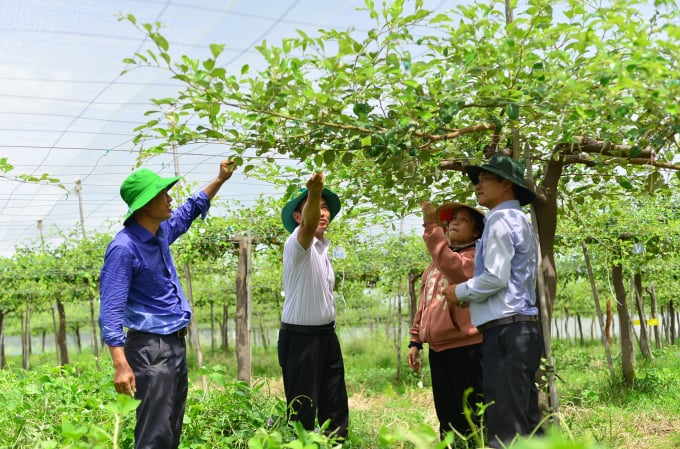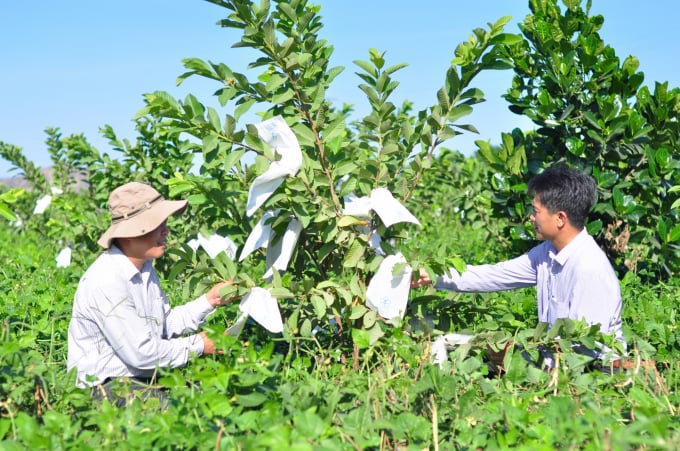May 20, 2025 | 19:49 GMT +7
May 20, 2025 | 19:49 GMT +7
Hotline: 0913.378.918
May 20, 2025 | 19:49 GMT +7
Hotline: 0913.378.918
Harsh weather and year-round heat would emerge as the advantages of Khanh Hoa, Ninh Thuan, and Binh Thuan to promote high-value agriculture provided that they are able to ensure sufficient water irrigation supply. The heat and huge temperature differential between day and night would encourage plants to generate a greater yield of higher quality than those in other places. The warmer heat also reduces the number of pests that attack plants.

Nha Ho Institute has developed many farming processes applying high technology, managing pests, and diseases, etc., on crops for the South Central region. Photo: Mai Phuong.
In recent years, south-central communities have supported turning their disadvantages into advantages in order to cultivate a variety of crops with extremely high economic value, such as green apple trees, grapes, and green asparagus, which generate billions of dong per hectare yearly.
Nha Ho Research Institute for Cotton and Agricultural Development, an affiliate of MARD, has focused on the research and transfer of varieties and technical processes of certain plants, including rice, corn, vegetables, and fruiters, among others; research and transfer of varieties and technical processes of crops endemic to semi-arid areas, including grapes, green apples, and green asparagus... serving agricultural restructuring to adapt to climate change in the Southcentral.
The director of the Nha Ho Institute, Dr. Mai Van Hao, disclosed that the institute had established 29 scientific and technical goals due to selection and orders by ministries and localities.
The Institute has selected and identified promising plant varieties suitable for the arid South Central region, such as the group of "fruit trees" with 2 varieties, fresh grapes (NH01-152 and NH16-01) with high economic value; 4 grape varieties serving wine processing (NH02-37, NH02-66, NH02-97, and NH02-137); 1 dual-purpose grapes variety (NH01-26); 2 apple varieties (TN1 and TN05) have a higher yield, quality, and one guava variety (Taiwan).

Nha Ho Institute has selected and identified promising plant varieties suitable for the arid South Central region. Photo: Minh Hau.
The forage plants group has chosen and identified two grass varieties (Mulato II and V3), one legume (Stylo), 1 biomass maize variety (DH17-5), and 1 sorghum variety (Latte). The vegetable group has identified the Atlas and Articus varieties of green asparagus.
In addition, the Institute conducts research to build and execute technological processes that serve the development of potential plant varieties chosen for the dry central South.
There are two prominent cultivation techniques for wine grape varieties issued by the agricultural sector of Ninh Thuan province and applied to production, two technical processes for the production and processing of red wine and white wine, and four standards for grape wine's raw materials and processing. Nha Ho Institute has also developed several high-tech agricultural procedures, pest and disease control, harvesting, preservation, processing techniques, etc. for the aforementioned crops.

Many new plant varieties researched and transferred by Nha Ho Institute have benefited farmers in the South Central region. Photo: Mai Phuong.
According to Dr. Mai Van Hao, the Institute selected between one and three types of fruiters, vegetable, and forage plants that are resistant to the region's harsh climate in order to assure the introduction of plant restructuring for the South Central Coast and nearby areas. The unit studied and chose high-quality grape varietals and safe growth techniques, then created and constructed a high-tech grape production system that responds to the dry, hot, and windy circumstances of Ninh Thuan.
Similarly, for apple trees, the Institute selected apple varieties with large fruit sizes and developed a cultivation process that applied technology suited to dry conditions in the South Central region, thereby conserving water, securing effective pest control, and producing exceptionally high-quality fruit. For asparagus plants, the Institute has also selected types and developed a high-tech application procedure for propagation and commercial production. The Department of Crop Production has acknowledged this process for dissemination into production as a technical accomplishment.
"On the basis of the initiation phase, we investigated and developed pilot models for varieties and technological intensive cultivation processes, and introduced them to communities, farmers, and enterprises.
Currently, the Institute's models have persuaded many farmers in the region to adopt them, and a number of firms have successfully implemented production. In the near future, we will concentrate on doing research and transferring research outcomes in an effort to cut labor and material expenses. Particularly investigating and implementing mechanization, digital technology, and automation of various production stages to serve large-scale growth; researching, processing, and using goods to strengthen value chains and establish a circular economy for every crop in the region."
Dr. Mai Van Hao.
Translated by Linh Linh

(VAN) Khanh Hoa is investing over 545 billion VND to develop 240 hectares of high-tech marine aquaculture in order to guarantee a consistent supply of seafood exports and achieve the USD 1 billion target.

(VAN) Minister of Agriculture and Environment Do Duc Duy held a meeting with Soopakij Chearavanont, Chairman of C.P. Group, on May 15.
/2025/05/16/3800-0-nongnghiep-143756.jpg)
(VAN) Suntory PepsiCo Vietnam coordinated with the Ministry of Education and Training to implement an education program on water conservation, reaching nearly 1 million primary school students nationwide.

(VAN) Vietnam’s TH Group officially put its high-tech fresh milk processing plant into operation in the Russian Federation, marking a historic moment as the first TH true MILK cartons were produced in Russia.

(VAN) Use of high-quality broodstock and biotechnology is regarded as the most effective approach to ensuring sustainable and economically viable shrimp aquaculture ahead of climate change and the emergence of increasingly intricate disease patterns.

(VAN) Carbon farming is a form of agricultural practices that helps absorb more greenhouse gases than it emits, through smart management of soil, crops, and livestock.

(VAN) This is a key content of the Memorandum of Understanding recently signed between the Vietnam Fisheries Society and Kunihiro Inc of Japan.